
Year 1980: Ravi Sinha from Ranchi recalls, "I was very passionate about theatre but my father coaxed me to go for commerce stream so that I could get a steady job in banking." Today, Ravi, 47, works as a manager at a prominent IT firm in Delhi. He has been dabbling in theatre for the last four years and writes beautiful poetry.
Year 2005: Gautam Pandit in Delhi recalls, "I saw this B-school ad which had 'impressive placement figures'. It talked about world-class education, infrastructure and heavily publicised its foreign academic collaborations. My parents and I were pretty convinced and I took admission." Today, the 24-year-old regrets his decision, and feels that the exorbitant fees he paid in no way justifies the education or the professional qualification he received. Working in a retail company, he draws a salary of just Rs 18,000 per month, in contrast to his friends who made the right choices.
Then and now
What is common between Ravi and Gautam? They are both bright and intelligent. And they were both keen on pursuing their respective career interests. For Ravi, his career dreams stood butchered at the altar of his parents' wishes. On the other hand, Gautam's decision was influenced by aggressive advertising by an institution. Be it the '"70s, '80s or even today, parents play an active role in their children's higher academic interests. And advertising is increasingly making its presence felt now. Delhi-based research firm GfK Mode undertook a survey to evaluate the major factors that govern the decision-making process in higher education in India including the the role of parents, teachers, advertisements, rankings, peer advisory etc.
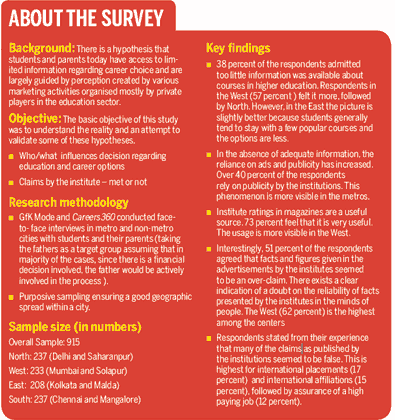
According to the survey, in 88 per cent of cases, students are influenced by their parents when it comes to deciding on education after class 12. This is followed by their teachers' advice in 79 per cent of cases. The survey also indicates that the influence of parent's advice is relatively higher in the metros than in non-metros.
Interestingly, Ravi does not 'blame' his parents, but confessed to being very angry at the time. "They did what was best for me," he admits. His story isn't different from that of the average Indian family where a steady stream of income is more important than traits such as creativity, enterprise or dynamism.
The lure of advertising
Seemingly, there has been a shift in parents' stance but is that helping the kids towards a sensible academic choice? And what about the surfeit of advertisements that inundate a young mind day in and day out?
The survey indicates that in the absence of adequate information (from credible sources), the reliance on ads and publicity has increased. Over 40 per cent respondents rely on publicity by institutions. This is more visible in the metros, the survey highlights (see box).
Parents vs students
Saransh Gupta, 17, is a class 12 student who finds himself in a similar situation as Ravi. However, even though what he wants and his mother wants is different, his parents are not as imposing as Ravi's. "We will support him in whatever field he wants to go," says his mother. But certain concerns are voiced regularly.
Saransh's interest in hotel management doesn't go down well with his mother who does not want her son to become a 'waiter'. The family feels this may not match its social status. Also, his mother feels that the financial investment isn't worth a career where her son has to wait on tables.
Voice of determination
"His elder sisters and their spouses are in good designations and earning very well," says his distressed mother, who has a master's degree in political science. However, she and Saransh's father JK Gupta, a charted accountant and chief manager with Allahabad Bank and based out of Ludhiana, refrain from dissuading Saransh.
An exasperated Saransh is aware of this. "I was aimless all this while," he puts forth his point. But just weeks back he met a visiting career counsellor at his school, DPS Ghaziabad, who helped him zero in on this option. "After much deliberation I felt this was the field for me. I will do what I want to do," he speaks in a soft but determined voice.
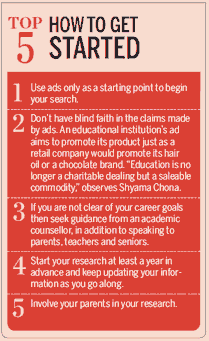
So why do parents resist and why do children remain so adamant? "It is a power struggle," Sudhanshu Mishra, a consultant psychologist points out. "Parents, especially fathers, see themselves playing the role of a protector, provider and procreator, and any instance that threatens to de-stabilise this unit, tends to unnerve them," he elaborates. "It's still a man's world," he adds. This clash of ideologies is not due to the generation gap story but a hierarchal power play, Mishra observes.
Behind the glamour
Shirin Siddiqui did not face much opposition from her parents when she decided to join a mass communications institute in Delhi. What made her zero in on this particular institute? "An ad in Amar Ujala," says the resident of Modinagar, a city located 90 km from central Delhi. The half page ad, which caught her attention declared three things: 100-per cent placement, media personalities as faculty and anchoring/ radio jockeying, as part of the programme.
"I always aspired to be a news reporter," says the 19-year-old. Two years into the course and with one year to go, Shirin is disappointed. The fee per semester is Rs 23,000, and the quality of education offered is poor.
Reality check
"So far we had visits from only two non-prime time anchors, after which there have been no 'personality' visits," apprises Shirin. "We have to struggle to obtain study material even during exams. We are only allowed photocopies, the cost of which we have to bear. And classes are not held regularly. Hence, students hardly come to college," she rues, feeling shortchanged.
"From a student's perspective making a choice can be difficult, and going with 'high visibility' is an easy but dangerous approach to take," says Professor Ramesh Venkateswaran, director SDM-IMD, a B-school based in Mysore.
The admission facade
Regular exposure to adverts impacts people, so does the advert size says Sudhanshu. "Psychologically, a larger-size ad communicates a sense of stability," he says. The glitzy ad compelled Shirin's mother to make a visit to the campus before Shirin enrolled. And she was impressed by the smart talk of the academic heads.
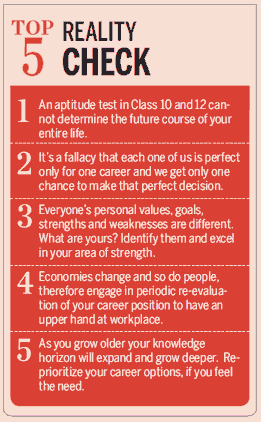
Saransh's mother tries her best to convince him to obtain good marks in class 12 so that if the hotel management option does not work out he can enrol in a B-school. "Good marks in class 12 are crucial," she emphasises, yet another time. He somehow believes that class 12 marks doesn't hold much significance in hotel management, she says plaintively. A student who achieved 72 per cent in class 10, and has slipped in his grades in class 11, her worry is understandable. Ideally, she wants Saransh to do an MBA.
However, according to Saransh, he is not studious and is hence, not cut out for management studies. "But I have the required attributes for a career in hotel management. I am patient. I have the ability to solve people's queries and I can also relate to people on an emotional level," he adds.
Knowledge is power
Some students are very clear about their career goals from the start. Upsana Goyal, a final year BA student of SSD Girls Degree College (Roorkee), wants to be an art teacher. Drawing is one of her subjects and she wants to pursue a master's degree in it. She enjoys the full support of her parents. "I have never been confused as to which line to take," she says.
Some students play it smart and do their share of research before buying the claims made by ads. "Students seem to be pretty well informed these days," says Shyama Chona, former principal of DPS, RK Puram in Delhi.
Making the twain meet
Shirin, the elder of the two siblings, did not face any stiff resistance from her parents. But in hindsight, she feels she should have done more research before deciding to join the institute. That is why, leaving the choice entirely to a teenager may not be a sensible approach. But where should a parent draw the line between guiding and imposing their will on the children?
Tips for parents
"If parents are deciding the graduation stream, or a college or a course for their children, then they must be updated with the latest developments," says Sudhanshu. "Otherwise let the exercise of collecting information be done mutually. For instance, parents could cut out newspaper clippings, check the accreditation status, read education surveys or visit the campus," he advises.
An amicable solution to end the parent-student stalemate is negotiation in the right manner. And the compromise happens unconsciously in most cases, he says. In a typical case, a father would let his son or daughter take up a three-month course in photography if he or she consents to take up the science stream, he cites an example.
Material gains
Money seems to be the deciding factor for most students. "I will take a posting abroad where I will earn good salary, live there for a few years, save some money, come back and probably open a chain of hotels here," says Saransh. For Shirin, glamour and the money associated with anchoring and reporting was a draw factor. Youngsters focusing too much on money bothers career counsellors. "The aim should be to take a job that matches one's core abilities," the experts advise.
Saransh and Shirin may both eventually find their feet. But they could save a whole lot of anxiety by taking the right steps for a smooth sailing career, by making informed decisions.
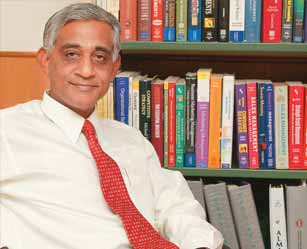
Here, Professor Ramesh Venkateswaran, director, SDM Institute for Management Development (SDM-IMD), Mysore, shares his views:
Exaggerated claims in the ads are obviously an area of concern. Students are willing to be swayed by those who shout the loudest and the most often. The point of advertising is to create awareness and persuade, but the buyer has to be careful. With the mushrooming of private B-schools, it is all the more critical that students zero in on a B-school with due diligence. Freebies and fancy claims about placements are tempting, but students have to learn to move away from using placement figures as a decisive statement on the worth of a business school.
Even when such figures are reasonably accurate, there is no indicator of the long-term worth of the B-school's certification. And they need not always reflect the quality of the learning experience that a candidate has undergone. From the student's point of view, making a choice can be difficult, and going with 'high visibility' is an easy approach, but a dangerous one to take. B-schools that may be spending a lot of money on advertising may or may not be able to spend money on delivering quality to the students when they finally reach the campus.
Students should make an effort to talk to seniors on selected campuses, evaluate B-schools on the basis of their faculty and the quality of the learning infrastructure and pedagogy, and then make a choice. If the programme is residential, the quality of living and learning for a two-year period also becomes critical. While listening to elders is important, with the information overload confronting parents today, students cannot afford to just pass on the buck to them. They themselves must make the effort to ensure that the hard-earned money will always go towards obtaining lasting value.

Sudhanshu Mishra, senior consultant psychologist, was earlier associated with Delhi Police Public School, and St Stephens College and shares his insight on why parents and students disagree and what is an amicable solution to settle it.
There will always be a conflict of interest between parents and children. It is a struggle for power which arises out of the inherent desire of parents to guide their children. Parents nudge their kids to find a career in medicine, engineering or civil services as it gives them a sense of achievement. It is also to show society that the family has grown in status from the previous generation.
One can see pride in parents when they say 'my son or my daughter is doing an MBA'. Which institution they are doing it from is immaterial, but the money involved in it, the projection of the future salary and the family reputation attached with it, all of these details are discussed by parents with swollen pride.
When parents give academic freedom to the child, he or she feels liberated. Some feel responsible. The tricky part is that a child may base his decision solely on monetary gains. It is true to some extent that the prospect of a corporate lifestyle, the swanky cars, large homes, a fancy wardrobe and shopping at the best malls, indirectly influences a student's career selection.
My suggestion to students: consider areas relevant to your aptitude. Start your research early to avoid last-minute panic, and keep your parents in the loop. Remember, you have the right to ask as many questions as you like (and there is a need to!), before taking admission in any institution.
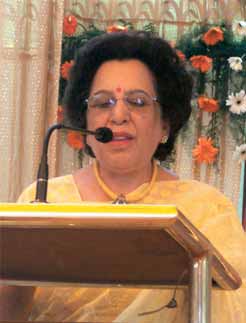
A recipient of the Padma Bhushan and Padma Shree awards, Shyama Chona emphasises the need for educating parents and also honing a child's strengths early on. According to her, ads should only be a tool for information-gathering, a point from where students can start further research. Chona now manages her time between Tamana, a school for 'differently-abled' children and Nai Disha, an organisation for rehabilitation of mentally challenged women.
Why do parents impose their will on children?
Parents always have very high ambitions and an honest desire that their kids do well. We are a developing economy and so even if you are a bad engineer, you will still earn better than someone who has done for instance, an MA in social sciences. Yet they sometimes forget that they are giving more importance to the career instead of being concerned if their child has the wherewithal to follow their dreams. Ideally kids should go through some aptitude tests to realise their potential. The capacity building also has to be done at a very early age.
How early?
If parents have in mind that my child must become an engineer then they should start polishing his/her analytical skills and logical reasoning from the beginning. But by just saying you have to be a doctor or an engineer because it is well-paying, is not done. For parents, an early choice relieves them of their anxiety because once the kid is in medical or engineering college, then they become free from the pressures of decision making. Whereas, if you are going for a BA or an MA, they are still suspended and anxious about the future.
What is the fallout if parents pressurise their kids in following a certain career?
Parents should realise that it is the individual versus the career. There have been many deaths taking place because children feel they are displeasing or disappointing their parents but the parents don't seem to consider if the child has the capability to follow their dreams. Therefore educating parents is also important.